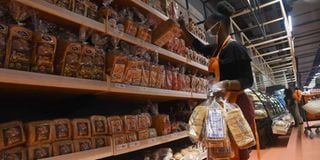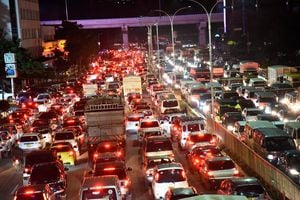
A supermarket attendant arranges loaves of bread on a shelf at a supermarket in Nairobi in this picture taken on October 12, 2020.
The National Treasury has proposed slapping value added tax (VAT) on the supply of ordinary bread in changes which would see the cost of the key consumer staple rising by upwards of Sh10.
In proposals carried in the 2024 Finance Bill published Satuday, the exchequer has proposed the removal of ordinary bread from the list of zero-rated supplies, a VAT exemption list.
This means that bread will cost more by up to Sh11 for a 400-gram loaf if Members of Parliament are to accept the changes.
The proposal to slap VAT on bread, which is charged at the rate of 16 per cent is seemingly the latest push by the National Treasury to increase its mobilisation of taxes to meet an ever-expanding national budget.
In March, Treasury Cabinet Secretary Prof. Njuguna Ndung'u hinted at the introduction of VAT on the product as his ministry targeted to boost collections from middle-class households which he views as the largest consumers of bread.
Ordinary bread, along with other consumer items such as maize and wheat flour, milk and sanitary products have until now been considered important warranting their exclusion from the 16 per cent VAT.
Middle-class
Prof Ndung'u, however, noted at the time that the current structure of zero-rating bread has failed to cushion the targeted households and has instead benefitted the middle-class who have relatively higher incomes.
"Total VAT collected in Kenya comprises about 40 per cent of the total taxes but 18 per cent of it goes to tax refunds for products assumed to be consumed by the poor. When you look at those products, you realize 95 per cent of refunds go to bread and milk. Who goes to the supermarket to buy bread and milk? We are not compensating the poor, we are compensating the middle class, " he told an IMF forum.
The supply of milk has however been retained in the VAT zero rating schedule.
At present, the supply of bread is on the same exemption list where consumers are not only sheltered from the 16 per cent tax rate but manufacturers and suppliers are also allowed to claim refunds on input VAT.
Spot check by Nation
This has ensured relatively lower prices for millions of households relying on bread as a staple on the breakfast table.
According to a spot check by Nation, the cost of a 400 kilogramme loaf of bread at retailer Naivas is between Sh56 and Sh70 while at Carrefour the cost ranged from Sh62 to Sh130 for premium bread brands.
Applying VAT on the prevailing retail prices means that bread prices would rise between Sh9 and Sh21, accounting for the final VAT charge alone.
A 400 grams loaf would for instance now start at Sh65 from the current Sh56 while for premium brands, the same loaf would cost as much as Sh150.
The push to slap VAT on bread comes in the backdrop of poor revenue collection by the Kenya Revenue Authority (KRA), which has been despite recently introduced tax and administrative measures in the 2023 Finance Act whose implementation began in July last year.
According to the latest disclosures by the exchequer, total revenue collected through nine months of the 2023/24 financial year which runs to June 30 trailed the target by Sh270 billion as of the end of March 2024.
Ordinary revenues or taxes missed the mark by Sh255. 1 billion, coming in at Sh1.58 trillion in the nine months in contrast to a higher target of Sh1. 84 trillion in the same period.
The poor performance of taxes has resulted in the National Treasury trimming both its revenue and expenditure targets including in the new 2024/25 fiscal year.
Other items withdrawn from the list of zero-rated/non-VATable goods include the transportation of sugarcane from farms to milling factories, inbound international sea freight and the supply of locally assembled and manufactured mobile phones.
The goods will now be subject to VAT at the standardised rate of 16 per cent alongside ordinary bread.









